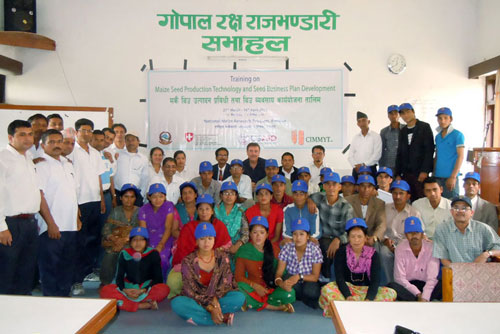 For decades, rice and wheat have been the main crops grown in Haryana, India, but with increasing degradation of natural resources, the focus has turned to finding viable alternatives to ensure future food and livelihood security.
For decades, rice and wheat have been the main crops grown in Haryana, India, but with increasing degradation of natural resources, the focus has turned to finding viable alternatives to ensure future food and livelihood security.
Over the last few years, high yielding maize hybrids have been tested during the short window following the potato harvest in Spring. The results are promising, showing that using a rice-potato-maize cropping system could produce more than 30 tons of food per hectare each year. This would increase not only productivity and profitability but would also address the emerging challenges of water scarcity and terminal heat effects, and offer solutions for different production environments.
To explore these findings in more detail, a multi-stakeholder consultation was organized by the Cereal Systems Initiative for South Asia (CSISA)-Haryana (CIMMYT-IRRI) in partnership with the CCS Haryana Agricultural University (HAU), Haryana State Department of Agriculture, Haryana Farmers Commission, the Directorate of Maize Research (DMR) of the Indian Council of Agricultural Research (ICAR), the Indian Maize Development Association (IMDA), and local maize farmers. The event, which took place on 19 April 2012 in Haryana, attracted around 350 farmers from five local districts, and 75 scientists and staff from public and private organizations.
The consultation included a farm visit, success stories, and presentations aiming to raise awareness about the potential of spring maize. Discussions explored domestic and international market potential; promotion of natural resource conservation methods; investments; technological advancements; new agricultural policy; and capacity building, not only for current farmers, but also for women and younger farmers.
Several speakers emphasized that joint effort would help to achieve more: CIMMYT cropping systems agronomist M.L. Jat suggested that building strong partnerships across the sector would be crucial for achieving sustainability, while R.S. Paroda of Haryana Kisan Ayog advised farmers to form self-help groups to share knowledge and experience.
Eminent scientist, former CIMMYT maize breeder, and World Food Prize laureate Surinder K. Vasal emphasized the need to strengthen research on maize hybrids in view of the changing climate. DMR director R. Sai Kumar explained how the available hybrids suited each different situation. Further support and advice was offered to farmers by J.S. Dhankar, director of extension education at CCS HAU and by IMDA president Sain Dass, who announced that he would ensure that the starch industry purchase all Haryana maize.
The government of Haryana’s additional director for agriculture, B.S. Duggal, also highlighted the incentive schemes available to promote agricultural diversification. Other participants included Indu Sharma, director of DWR, Karnal; Saroj Jaipal, head of RRS, HAU, Karnal; S.K. Gahlawat, deputy director of Agri, Karnal; Pradeep Meel deputy director of Agri, Yamunanagar; R.S. Sangwan, deputy director of Agri, Kurukshetra; S.P. Goyal, coordinator of Krishi Vigyan Kendras (KVK), Kurukshetra; Dalip Gosain, KVK coordinator, NDRI, Karnal; S.K. Sharma, head of CSSRI Karnal; Virender Kumar, research platform coordinator, CSISA Karnal; and B.R. Kamboj, hub manager, CSISA Haryana.